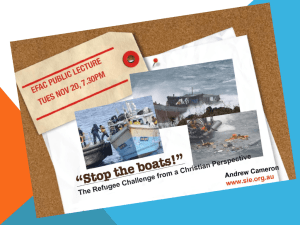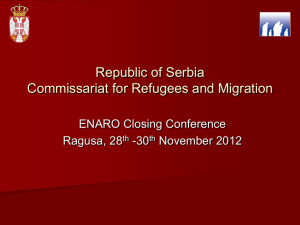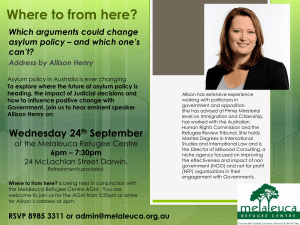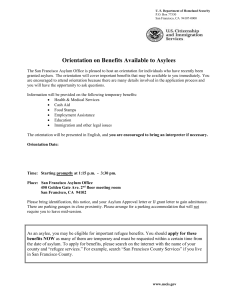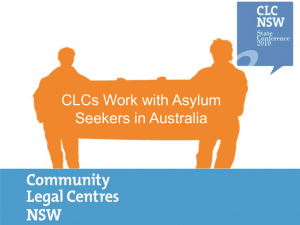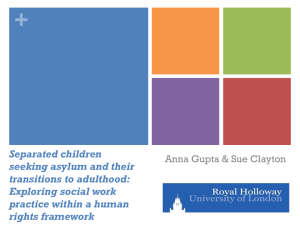EMN Bulletin 12th Edition June
advertisement
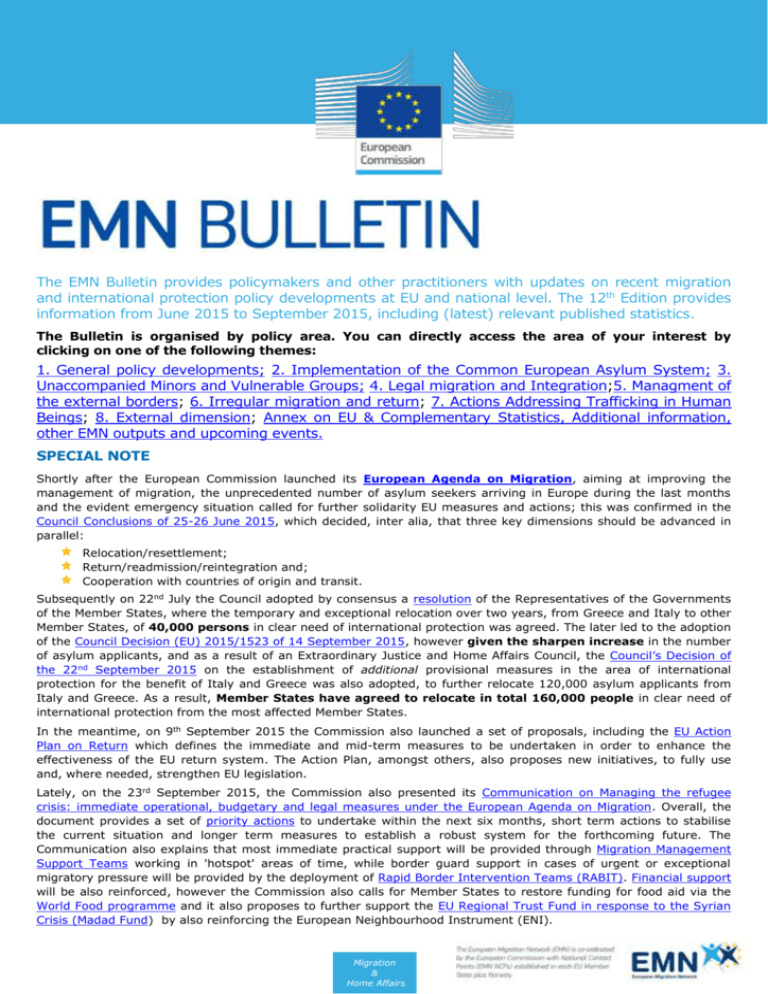
The EMN Bulletin provides policymakers and other practitioners with updates on recent migration and international protection policy developments at EU and national level. The 12th Edition provides information from June 2015 to September 2015, including (latest) relevant published statistics. The Bulletin is organised by policy area. You can directly access the area of your interest by clicking on one of the following themes: 1. General policy developments; 2. Implementation of the Common European Asylum System; 3. Unaccompanied Minors and Vulnerable Groups; 4. Legal migration and Integration;5. Managment of the external borders; 6. Irregular migration and return; 7. Actions Addressing Trafficking in Human Beings; 8. External dimension; Annex on EU & Complementary Statistics, Additional information, other EMN outputs and upcoming events. SPECIAL NOTE Shortly after the European Commission launched its European Agenda on Migration, aiming at improving the management of migration, the unprecedented number of asylum seekers arriving in Europe during the last months and the evident emergency situation called for further solidarity EU measures and actions; this was confirmed in the Council Conclusions of 25-26 June 2015, which decided, inter alia, that three key dimensions should be advanced in parallel: Relocation/resettlement; Return/readmission/reintegration and; Cooperation with countries of origin and transit. Subsequently on 22nd July the Council adopted by consensus a resolution of the Representatives of the Governments of the Member States, where the temporary and exceptional relocation over two years, from Greece and Italy to other Member States, of 40,000 persons in clear need of international protection was agreed. The later led to the adoption of the Council Decision (EU) 2015/1523 of 14 September 2015, however given the sharpen increase in the number of asylum applicants, and as a result of an Extraordinary Justice and Home Affairs Council, the Council’s Decision of the 22nd September 2015 on the establishment of additional provisional measures in the area of international protection for the benefit of Italy and Greece was also adopted, to further relocate 120,000 asylum applicants from Italy and Greece. As a result, Member States have agreed to relocate in total 160,000 people in clear need of international protection from the most affected Member States. In the meantime, on 9th September 2015 the Commission also launched a set of proposals, including the EU Action Plan on Return which defines the immediate and mid-term measures to be undertaken in order to enhance the effectiveness of the EU return system. The Action Plan, amongst others, also proposes new initiatives, to fully use and, where needed, strengthen EU legislation. Lately, on the 23rd September 2015, the Commission also presented its Communication on Managing the refugee crisis: immediate operational, budgetary and legal measures under the European Agenda on Migration. Overall, the document provides a set of priority actions to undertake within the next six months, short term actions to stabilise the current situation and longer term measures to establish a robust system for the forthcoming future. The Communication also explains that most immediate practical support will be provided through Migration Management Support Teams working in 'hotspot' areas of time, while border guard support in cases of urgent or exceptional migratory pressure will be provided by the deployment of Rapid Border Intervention Teams (RABIT). Financial support will be also reinforced, however the Commission also calls for Member States to restore funding for food aid via the World Food programme and it also proposes to further support the EU Regional Trust Fund in response to the Syrian Crisis (Madad Fund) by also reinforcing the European Neighbourhood Instrument (ENI). Migration & Home Affairs 1. GENERAL POLICY DEVELOPMENTS WHAT IS THE EUROPEAN MIGRATION NETWORK (EMN)? EU DEVELOPMENTS AND UPDATES 2. On the 10th August 2015, the Commission approved 23 new multiannual national programmes, seven under the Asylum, Migration and Integration Fund (AMIF) and 16 under the Internal Security Fund (ISF) in order to further support Member States dealing with high migratory flows. The total funding for the agreed programmes is approximately 2.4 billion euro for the period 2014-2020. A network co-ordinated by the European Commission, assisted by a Service Provider, in co-operation with National Contact Points (EMN NCPs) established in each Member State plus Norway. Its purpose is to provide up-to-date, objective, reliable and comparable information on migration and asylum, with a view to supporting policymaking in the European Union in these areas, as well as to the wider public. More information, as well as all EMN outputs, is available on the EMN Website. IMPLEMENTATION OF THE COMMON EUROPEAN ASYLUM SYSTEM EU DEVELOPMENTS AND UPDATES As announced in the latest Commission’s Communication, concerning the implementation of the Common European Asylum System, on the 23rd September 2015 the Commission adopted 40 infringement decisions against several Member States for failing to fully implement legislation making up the Common European Asylum System. On the 9th September 2015 the Commission launched a set of proposals to help addressing the current refugee crisis. In the field of asylum, these included a proposal for a Crisis Relocation Mechanism, a proposal for establishing provisional measures in the area of international protection for the benefit of Italy, Greece and Hungary, and a proposal for a Regulation establishing an EU common list of safe countries of origin. The latter aims at facilitating a swifter processing of asylum applications from candidates originating from countries Judgment of the European Court of Justice considered to be safe across the EU and for faster Case C‑373/13. returns if the individual assessments of the applications In its judgment of 24 June 2015, the Court ruled confirm no right of asylum. The list includes the that a residence permit for international protection following countries: Albania, Bosnia and Herzegovina, granted under the conditions of Directive the Former Yugoslav Republic of Macedonia, Kosovo, 2004/83/EC may be revoked for ‘compelling reasons Montenegro, Serbia and Turkey. of national security or public order’ when the On 31st August 2015 emergency assistance funding was refugee supports a terrorist organisation included on announced by the Commission to help address the the list annexed to Council Common Position situation in Calais, France. A total of 5.2 million euro 2001/931/CFSP of 27 December 2001. were agreed to be allocated under the Asylum, Nevertheless, the competent authorities have to Migration and Integration Fund (AMIF) to offer carry out an individual assessment of the specific humanitarian assistance to approx. 1,500 irregular facts concerning the actions of both the organisation migrants residing in the area surrounding the day and the refugee in question before taking a decision centre "Jules Ferry" and to support the transport of to revoke the residence permit. asylum seekers from Calais to other locations in France. LATEST RELEVANT STATISTICS According to the latest Eurostat data, the number of applications for international protection lodged in the EU continued to rise in Q2 2015, reaching up to 228,600 applications. Also, 93% of the applicants were first time applicants (213,200), this number represents an increase of 85% when compared to Q2 2014 and 15% to the same quarter of the previous year. During the second quarter 2015, the top three countries of origin of asylum seekers were Syria (21%), Afghanistan (13%) and Albania (8%). The number of Kosovars, who were the third top nationality in Q1 2015, sharply dropped from 50,000 to 10,000. A total number of 119,775 first instance asylum decisions were issued in the EU and Norway in Q2 2015. Total positive decisions for this period amounted 55,280, while negative decisions accounted for 64,495 (see Figure 2 in Annex). The largest number of first instance asylum decisions was issued in Germany, followed by France, Italy and Sweden. EASO published its Quarterly Asylum Report for the Q1 2015. According to the report, in 2015 71% of the total asylum applications in the EU were registered in Germany (38%), Hungary (15%), Italy (7%) and France (7%). NATIONAL DEVELOPMENTS Austria: A special task force was established to coordinate all measures related to the current sharp increase in the number of asylum-seekers. All Director-Generals of the Federal Ministry of the Interior are represented as well as the Federal Office for Immigration and Asylum, the criminal intelligence service, the federal agency for 2 state protection and counter-terrorism. In addition, external partners are also part of an expert group composed by the Federal Ministry for Europe, Integration and Foreign Affairs, the Austrian Armed Forces or the Federal Ministry of Finance as well as UNHCR and NGOs particularly dealing with asylum, e.g. the Austrian Red Cross, the Samaritans and the Federal fire brigade federation. Following the reception capacity challenges faced by the Initial Reception Centre Traiskirchen, in August 2015, a legislative initiative to introduce a constitutional provision was presented. The aim is to give the Federal Government the right to establish accommodation for asylum-seekers on federal properties, without the authorisation from the respective local authorities. On the 25th August 2015, Christian Konrad was appointed as refugee coordinator in order to grant accommodation for refugees more efficiently. Belgium: Following the increase in the number of asylum seekers, the Belgian government approved in August and September a series of measures to progressively increase the reception capacity for asylum seekers, from 16,200 places in July to around 36,000 places by the end of 2015. On 3rd September 2015 amendments to the Immigration Act came into force, these extended the possibilities to refuse to grant refugee status, to withdraw international protection or to exclude someone from international protection due to the threat he/she represents to society or national security. Croatia: A new Act on International and Temporary Protection entered into force on 1st July 2015. The act aligns the Croatian legislation with Articles 4, 6 and Chapter 6 of the Temporary Protection Directive (2001/55/EC), prescribing the duration and end of temporary protection and the reception and transfer of foreigners under temporary protection pursuant to the principle of the solidarity of the Community. Czech Republic: A new Migration Policy Strategy was approved in July 2015. The aim of the strategy is to clearly define a balanced and flexible migration policy, including its priorities in the area of migration and international protection, as well as principles, objectives and instruments. The strategy also aims to respond to the current refugee situation and the need to clearly express the view of the Czech Republic in this area. Following the Czech Government’s approval on the resettlement of refugees and the temporary exceptional mechanism of relocation of refugees from Italy and Greece on the basis of the Council Conclusions from 25-26 June 2015, a new working group for the preparation of the resettlement and relocation of refugees was established to ensure the smooth process and also the integration of these persons into Czech society. The first group of Syrian families will be transferred from Jordan to the Czech Republic during autumn 2015. Estonia: The Estonian Government has agreed to accept approximately 500 refugees under the EU Refugees Distribution Plan. It is the first time Estonia takes part on a refugees’ distribution programme. A relocation system is currently being set up and the first refugee families are expected to arrive to Estonia by the end of 2015. Given that the current accommodation centre (Vao) has reached its maximum capacity- following the increase in the number of asylum seekers- the Ministry of Social Affairs is planning to open an additional accommodation centre for asylum seekers. France: On 30th July 2015 the law on the asylum reform was published. The main amendments concern the asylum procedure, for example these include: reduced processing time, additional asylum seekers rights/guarantees, improved housing conditions and better financial assistance with allowance linked to family composition. The creation of one-stop shops will also aim to improve the reception conditions. Moreover, asylum seekers have now access to continuous vocational training and to the French labour market after a nine-month period (instead of 12) following the filing of their application, provided they are not responsible for this delay in the processing time. Overall, the new law provides more visibility to the status of stateless persons and a full recognition of their rights. Germany: The Act redefining the right to remain and termination of residence (Gesetz zur Neubestimmung des Bleiberechts und der Aufenthaltsbeendigung) entered into force on 1st August 2015. The act introduces the responsibility of the Federal Office for Migration and Refugees for: setting a time-limit for bans on entry and residence for rejected and deported applicants and; for the determination of a ban on entry and residence, as well as setting a time limit on its validity for applicants from safe countries of origin and in cases of repeated follow-up applications. As of 25th June 2015 the Federal Office introduced an accelerated asylum procedure for applicants from Eritrea. Eritrean applicants are now provided with a special questionnaire by which they have the opportunity to provide written account of their application reasons, instead of an interview. Greece: In August 2015 the Open Hospitality Centre in "Eleonas" has been prepared for the accommodation of 720 people. The "Eleonas Centre" tasks are of great importance concerning the refugee situation given that the centre prioritizes safety, decent standards and the well-being of the people it assists. Representatives from the Greek Asylum Service and UNHCR provide information for those seeking international protection in Greece, while the Red Cross and other Greek NGO΄s offer assistance and services. At the same time, a relative decline in number of asylum applications has been registered. 3 Ireland: An ‘Irish Refugee Protection Programme’ has been established for persons seeking international protection. Under the Programme Ireland will accept up to 4,000 persons under the EU Resettlement and Relocation Programmes: 520 programme refugees (currently being resettled to Ireland); 600 persons (already committed under the proposed EU Relocation programme); and up to 2,900 additional persons in need of international protection (as part of the EU programme agreed by Council in September). The Irish Department of Defence has committed to continuing the deployment of Naval Service vessels to the Mediterranean, assisting the Italian authorities in humanitarian search and rescue operations. Lithuania: The Lithuanian Government approved the resettlement and relocation of 1,105 refugees within a period of two years. Luxembourg: On 13th July 2015, the inauguration of the new reception facility for newly arrived applicants for international protection “Lily Unden” took place. This reception centre can accommodate 120 persons and offers a better quality of life to its inhabitants. It is managed by the Red Cross Luxembourg based on a collaboration agreement signed between the Luxembourg Reception and Integration Agency. Furthermore, a former language therapy centre was swiftly reconverted to be able to house around 300 applicants for international protection. Three other structures are also currently being reconverted in order to be able to accommodate the increasing number of applicants. The bill n°6779 on international protection and temporary protection which intends to abolish the current asylum law was deposed at the Chamber of Deputies at the beginning of the year. Between June and September 2015 the Luxembourgish Refugee Council, the State Council as well as the Consultative Commission on Human Rights of the Grand Duchy of Luxembourg submitted their respective opinions on the bill. The Netherlands: As a result of the increase in the asylum influx and pressure on the asylum system, on the 18th August 2015 a temporary Ministerial Commission on Migration was established. Amongst other issues, the Commission aims to discuss measures to: ensure a swift and thorough reception and procedure for both asylum seekers as admitted refugees and beneficiaries of international protection in the Netherlands, to diminish the causes in third countries to migrate to Europe and to contribute to a balanced EU policy of limiting migration flows and to arrive at a proportionate apportionment of responsibility within the EU. The Commission will be composed by the relevant ministries and secretaries of State. Norway: On 9th September 2015 the Directorate of Immigration enforced its emergency plan in order to manage the situation of drastic increase in the numbers of asylum seekers. United Kingdom: On 7th September 2015 the Prime Minister announced an expansion of the UK’s existing Syrian Vulnerable Persons Relocation Scheme. Through this expansion, the UK expects to resettle 20,000 Syrians in need of protection. This number is in addition to those resettled under the Gateway and Mandate programmes and the thousands of people who receive protection in the UK under normal asylum procedures. Subsequently on 16th September, the Home Secretary gave a statement updating the House of Commons on the Syrian refugee situation. 3. UNACCOMPANIED MINORS AND VULNERABLE GROUPS EU DEVELOPMENTS AND UPDATES On 31st August 2015, Frontex published a handbook named “VEGA Handbook: Children at airports” . The aim of the handbook is to provide guidelines and recommendations to border guard officers to identify children at risk at airports while paying special attention to their rights of children. In particular, the handbook refers to both unaccompanied minors and accompanied and separated minors. Moreover, the border guard officers are also required to be able to identify criminal threats to the child’s wellbeing. 4. LEGAL MIGRATION AND INTEGRATION EU DEVELOPMENTS AND UPDATES The European Commission together with the OECD launched the "Indicators of Immigrant Integration – Settling In 2015". The joint report provides the first broad international comparison across the EU and OECD countries on integration outcomes for migrants and their children. The report covers 34 key indicators in areas such as employment, education and skills, social inclusion, civic engagement and social cohesion. A special focus on young people with an immigrant background is provided in the report, as these are often seen as the benchmark for the success or failure of integration. 4 NATIONAL DEVELOPMENTS Estonia: As of the 1st August 2015 all third country nationals and citizens of the EU who have legally resided in Estonia for less than five years are provided with the possibility to take part in one-day adaptation training and 80 hours of Estonian language training (level A1). The adaptation training consists of basic and additional models that correspond to the needs and interests of the foreigner (i.e. working and entrepreneurship, studying, research, family life, children and young people, international protection). Judgment of the European Court of Justice Case C‑153/14 and Case C‑579/13. The Court assessed the requirement of civic integration exams in its rulings of 9 July 2015 and of 4 June 2015. In that of 9 July, the Court stated that Member States may require TCNs to pass a civic integration examination, before authorising entry into and residence in their territory for the purposes of family reunification. Such exam may consist in an assessment of basic knowledge of the language of the Member State and of its society and can entail the payment of costs, provided that it is not made impossible or excessively difficult to exercise the right to family reunification. In the second case (4 June), the Court clarified that those TCNs who are eligible to or already possess long-term resident status may be obliged to pass a civic integration examination, under pain of a fine, at the condition that the achievement of the objectives pursued by EU law is not jeopardised. Germany: The Act redefining the right to remain and termination of residence also introduced changes in the German statutory order for employment matters (Beschäftigungsverordnung). For example, it now regulates the labour/internship permits for newly thirdcountry nationals entering Germany. Greece: A new law (L.4332/2015) was enacted in July 2015 (Gazette of the Hellenic Republic, series A’, issue No 76/9.7.2015). The law amended the Greek Nationality Code (articles 1-3) and introduced new provisions that allow third-county national children born or raised in Greece to acquire Greek citizenship (i.e. to 2nd generation immigrants). The new provisions enable children to acquire Greek citizenship, provided they fulfil certain criteria including: birth and attendance of a Greek school in Greece, successful attendance of nine classes of Primary/Secondary Education or six classes of Secondary Education in a Greek school in Greece and; graduation of a Greek University. Ireland: New legislation has been introduced under the Civil Registration (Amendment) Act 2014 giving marriage registrars in Ireland new powers to prevent marriage for immigration purposes only. In addition, the Irish Naturalisation & Immigration Service (INIS) has announced changes to the application for permission to remain in Ireland on the basis of parentage of an Irish citizen child effective from 1st October 2015. The Netherlands: As of 1st July 2015, foreign au pairs working in the Netherlands and their sponsors are requested to sign a contract to state there is no biologically relation -up to the third degree- between the parties, as this is consider illegal. In addition, the provision requiring the sponsor to inform the Dutch Immigration and Naturalization Service about any changes in the daily schedule of the au pair has been revoked, due to the impractical nature of this measure, unless this alteration has consequences for the au-pair’s eligibility for a provisional residence permit. On the 22nd July 2015 amendments were introduced in the Dutch policy establishing the actual family relationship test between parents and adult children intending to reunite their parents who have been granted asylum in the Netherlands. Overall, policy has been aligned with underage children policy; testing of the so-called ‘more than normal emotional ties’ has been replaced by the simple testing of the existence of family ties before the departure of the parent(s) from the country of origin. Norway: In June 2015, the Government submitted a draft bill to the Storting (national assembly) to introduce new requirements for obtaining Norwegian citizenship. The proposed requirements will ensure that all persons who are granted Norwegian citizenship have a minimum command of spoken Norwegian and undertake a civics test. A proposal to amend the Introduction Act to improve the quality of Norwegian language training and the Introduction Programme has been also submitted to the Storting (national assembly) by the Government. Amongst other issues, the proposal provides that: municipalities will be responsible for initiating courses in language training and social studies; participants have to document skills in Norwegian civics to be exempted from the social studies course and participants in the Introduction Programme can be granted leave of absence for up to one year if they are offered a job. Spain: The project “Training for the Prevention and Detection of Racism, Xenophobia and related Intolerance at school - FRIDA ("Formación para la prevención y detección del racismo, la xenofobia y formas conexas de intolerancia en las aulas”) has been implemented during the reporting period. It aims to train teachers and specialists in education on non-discrimination by racial or ethnic origin and hate crimes and on the criteria for detection of racist or xenophobic incidents and hate crimes at school, and to disseminate the knowledge acquired, together with the training material that will be produced. All regional governments have participated in 5 the project and the main result will be a handbook, to be launched by the Ministry of Employment and Social Security (OBERAXE) and the Ministry of Education. Economic migration Ireland: Following amendments to the Irish Employment Permits (Amendment) Regulations 2015, changes have been made to the Highly Skilled Occupations List in response to identified shortages in occupations in the Irish labour market. Student migration France: In order to improve the reception conditions of third country national students and increase France’s attractiveness, the decree of July 30th 2015 modified the competency of the Préfet (Police authorities) in charge of issuing French residence permits. According to the decree, the competency to issue a residence permit now depends on the location of the French university or school where the residence permit application is filed, provided that the entity has concluded a convention with the State. If no convention has been signed, the competency resides on the entity established at the student’s home address. Also, on the 8th and the 25th of June respectively, France signed a “Working Holidays” agreement with Chili and Colombia (in addition to those with Japan, New Zealand, Canada, South-Korea, Russia, Argentina, Hong-Kong and Brazil). These last two agreements will be soon enforced. The agreement provides nationals from one of the signatory countries aged between 18 and 30 years old with an opportunity to spend holidays and to work in the host country. Ireland: Reforms have been introduced to the student immigration system for international education in Ireland, specifically to the list of eligible programmes for study. 5. MANAGEMENT OF THE EU EXTERNAL BORDERS EU DEVELOPMENTS AND UPDATES During the month of September, Austria, Germany and Slovenia notified the European Commission on their intention to temporarily reintroduce border controls, as an exceptional possibility foreseen and regulated by the Schengen Borders Code. On the 29th July 2015, the Public Consultation on the Smart Borders Package was launched. The Smart Borders Package overall, aims, amongst other things, to improve the management of Schengen Member States’ external borders, fight against irregular migration and provide information on over-stayers. The consultation aims to feed into the on-going impact assessment of the Smart Borders package and the policy preparation of the revised proposal that will be issued by the Commission. The consultation will be open until 29th October 2015. NATIONAL DEVELOPMENTS Austria: On 16th September 2015 temporary border controls, requiring all passengers to show travel documents were conducted. Croatia: Following the closure of Hungarian borders with the Republic of Serbia, an increase in the number of migrants from Serbia towards the state border with the Republic of Croatia has been registered. The number of illegal entries detected by the Croatian police has also significantly increased. France: On the 16th July 2015 a “Smart borders” operation was launched in Cherbourg. The town is characterised for its increased migrant influx and thus it has been selected to host a three month test on the use of technological advances in the biometric field (e.g. iris scan, fingerprints and facial recognition). Greece: As a result of the high migratory pressures on the islands of Eastern Mediterranean Sea route, Greece and in particular the Hellenic Police, will support the Frontex Joint Operation “POSEIDON Sea 2015”, with the internal redeployment of 76 officers with expertise on border surveillance, screening and language skills. In addition, efforts were made to increase the number of Eurodac devices and ensure the availability of containers for registration and screening purposes. Ireland: Progress on phase one of the civilianisation of frontline immigration control procedures at Dublin Airport has been positively reviewed by the Irish Department of Justice and Equality. The Netherlands: In September 2015, the State Secretary of Security and Justice decided to intensify controls within the context of Mobile Security Monitoring due to the large influx of asylum seekers, for an initial period of four weeks. 6 6. IRREGULAR MIGRATION AND RETURN EU DEVELOPMENTS AND UPDATES The Commissions Communication on Managing the refugee crisis, also calls for Member States to further support for the Emergency Trust Fund for stability and addressing root causes of irregular migration and displaced persons in Africa. In total 1.8 billion euro from the EU's financial means have been allocated to set up the trust fund. The aim is to improve stability, address root causes of irregular migration flows and support the regions of the Sahel, Lake Chad, the Horn of Africa, and the North of Africa. Judgment of the European Court of Justice Case C‑554/13. The Court of Justice ruling of 11 June 2015 pointed out that, in light of article 7(4) of the Return Directive (Directive 2008/115/EC), the refusal to grant a period for voluntary departure to an illegal staying third-country national on the ground that s/he poses a risk to public policy requires a case-bycase assessment, including whether that person’s fundamental rights are respected. Such a person cannot be deemed to pose a risk to public policy on the sole ground that s/he is suspected, or has been criminally convicted, of an act punishable as a criminal offence under national law. The national authorities should take into consideration other factors, such as: the nature and seriousness of the act, the time elapsed since it was committed, the reliability of the suspicion that the person concerned committed the alleged criminal offence. As part of the Commission comprehensive package of proposals launched on 9th September 2015, on the field of return, these included EU Action Plan on Return –as previously mentioned- and in parallel a Return Handbook to be used by the national competent authorities when carrying out returns tasks. The handbook is aim to serve as the main training tool in standards and procedures concerning the application of the Return Directive (2008/115/EC). Frontex released on 18th August 2015 a technical report, the Document Challenge II, on a testing exercise carried out on human and machine performance in detecting and classifying genuine and false travel documents. The exercise underlined a variety of weaknesses and vulnerabilities in the process of inspecting travel documents. Consequently, a few recommendations have been put forward in order to harmonise minimum requirements and functionalities at an EU-level. On the 26th of June 2015, the EU naval operation "EUNAVFOR Med" was launched by the Council of the European Union. The operation against human smugglers and traffickers in the Mediterranean aims to identify, capture and dispose of vessels and enabling assets used or suspected of being used by migrant smugglers or traffickers. LATEST RELEVANT STATISTICS The Frontex Western Balkans Quarterly report was also published on 4th September 2015, covering Q2 2015 (April-June). The report aims at identifying irregular migration developments, taking into consideration seven variables: detections of illegal border-crossing between and at border-crossing points (BCPs), refusals of entry, illegal stays, number of asylum applications, detections of facilitators and of fraudulent documents. According to the report, at least 52,200 non-regional migrants have been detected illegally crossing regional borders. This figure indicates an increase of 219% when compared to the previous quarter. Non-regional migrants are mostly in transit from Turkey, Greece and Bulgaria and are mostly Syrians and Afghans. On the other hand, illegal-crossing by regional migrants has decreased by 83% when compared to the previous quarter and constitutes only 8% of the total illegal border-crossing of Q2 2015. Concerning detection of facilitators, an increase of 11% was registered when compared to Q1 2015. Facilitators are mostly citizens of Western Balkans countries (79%), with Serbians been the most represented nationality (59%), followed by Macedonians and Albanians. The parallel reading of these figures shows that Serbia is still the Western Balkans country mostly affected by the non-regional flow. NATIONAL DEVELOPMENTS Austria: Following the enforcement of the legal amendments to the Alien Law, the scope of return counselling and assistance was extended beyond asylum-seekers to include other third-country nationals at all stages of the procedure. Amendments specify an obligation for certain third country nationals who have been issued a return decision to participate in return counselling. A government proposal was also presented on the fight of smuggling. The aim is to facilitate the possibility to summon smugglers into investigative custody. Greece: On 7th September 2015 Law 4332/2015 on the Amendment of Greek Citizenship Code provisions entered into force. The law introduced amendments regarding the competence of the Ministry of Interior, as well as a provision that states that a completed and duly processed residence permit application prevents the issuance of a return decision. In such cases, before issuing a return decision against third- country nationals who have applied for a residence permit under exceptional reasons, the services of the Greek Police now need to contact the Ministry 7 of Interior to confirm the third country national has fulfilled the formal conditions to examine the residence application. The Law also include amendments regarding sanctions on irregular migrants rescue cases, which will no longer be imposed to men rescue situations at sea, transport for persons in need of international protection. Amendments also include provisions to protect third-country nationals who fall under the subscription terms of the principle of non-refoulement from deportation. For example, applications from nationals from Syria, Yemen, South Sudan, Palestine, Eritrea, Somalia, etc. will be registered and would not be issued an expulsion decision, hence a suspension, and will be issued a certificate of non- expulsion for humanitarian reasons. Furthermore, in order to address the high mixed migratory pressures during the peak summer period, the Hellenic Police in cooperation with Frontex launched a Rabit Exercise (Rapid Border Intervention Team) named “REX 2015”. The exercise will run from the 19th of August until the 19th of October 2015. The aim of REX 2015 is to strengthen the border control at the Greek Turkish land borders and to increase the effective prevention of illegal migration and other cross-border related crime. The Netherlands: As of the 15th of August 2015, asylum seekers from Kosovo and Mongolia are no longer eligible for a return fund upon rejection of their asylum request. The decision comes after suspicions that such funds were an incentive for nationals from these countries to apply for asylum in The Netherlands. On 25th June 2015 the Advisory Committee on Migration Affairs in the Netherlands (ACVZ) presented its report ‘The strategic country approach to migration: between ambition and reality’. The Dutch government aims to enhance the effectiveness of return policy by improving the cooperation of countries of origin in the forced return of their nationals. A study on best practices in the strategic approach in Belgium, France, Spain and the United Kingdom is included. United Kingdom: Illegal migrants will face a jail sentence for working in the UK, under measures to be included in the new Immigration Bill. The Immigration Bill, due to be introduced this autumn, will include a range of new powers to deter people from trying to find work in the UK illegally and measures to deal more effectively with rogue businesses who offer them employment. A new illegal work offence will allow wages to be seized as proceeds of crime. Anyone prosecuted for this new offence will face a sentence of up to six months in prison and an unlimited fine in England and Wales. 7. ACTIONS ADDRESSING TRAFFICKING IN HUMAN BEINGS EU AND INTERNATIONAL DEVELOPMENTS AND UPDATES On 22nd July 2015 the Group of Experts on Action against Trafficking in Human Beings (GRETA) published its fourth general report, covering its activities from August 2013 until September 2014. The document provides an overview of GRETA activities, including meetings, evaluations and publications held by GRETA during the above mentioned period. Round-table meetings were also organised in some countries in order to follow the implementation of GRETA’s recommendations. In addition, GRETA also published some national reports concerning the implementation of the Council of Europe Convention on Action against Trafficking in Human Beings: these concerned the evaluations of Germany, Hungary, Finland and Lithuania. The United Nations Office of Drugs and Crime published in July 2015 a Paper in relation to its Trafficking in Persons Protocol. The study aims at explaining some concepts, in particular the concept of exploitation contained in the above mentioned Protocol, in order to make sure that these concepts are clearly understood and for the Protocol to be consistently implemented and applied by the States Parties. NATIONAL DEVELOPMENTS Germany: The new Act on the redefinition of the right of residence, as well as the Residence Act, now stipulate that a third-country national who is a victim of a criminal offence pursuant to Sections 232, 233 or 233a of the Criminal Code shall (previously “may”) be granted a residence permit for a temporary stay, even if the victim is required to leave the federal territory (§ 25 sect. 4a s.1 Residence Law § 29 sect. 3 s. 1 Residence Law). The Netherlands: On the 18th June 2015, the Dutch Ministry of Security and Justice launched a website aimed at informing victims, professionals and citizens about the organisations involved in the detection and repression of human trafficking, as well as on the provision of assistance to the victims of these crimes. United Kingdom: As of 31st July 2015 criminals convicted of human trafficking and modern slavery face sentences to life in prison. The first series of measures, focused on criminal justice provisions, to come into force include: ensuring that those who commit these crimes are subject to the toughest possible asset recovery regime; introducing Slavery and Trafficking Reparation orders, which encourage the courts to use seized assets to compensate victims; and the commencement of regional pilots of the National Referral Mechanism (NRM) – the system used across Government and by various agencies to refer, protect and support victims of modern slavery. 8 8. EXTERNAL DIMENSION NATIONAL DEVELOPMENTS No developments were reported on this field during the Bulletin period. 9 ANNEX: EU & COMPLEMENTARY STATISTICS, ADDITIONAL INFORMATION, OTHER EMN OUTPUTS AND UPCOMING EVENTS EU Figures Figure 1a: Asylum applications in EU-28, January 2014 – June 2015 Source: Eurostat [migr_asyappctzm], accessed on 24th September 2015. Figure 1b: Asylum and new asylum applicants in EU-28 and Norway, April – June 2015 period Source: Eurostat [migr_asyappctzm], accessed on 24th September 2015 Figure 2: First instance asylum decisions in EU-28 and Norway, second quarter 2015 (quarterly data) Source: Eurostat [migr_asydcfstq], accessed on 24th September 2015 – Negative decisions include also “Dublin decisions” (according to Art. 4, EC Regulation n. 862/2007) Data were not available for Austria. 10 Figure 3a: Illegal nationalities (in %) cross-border crossing – Top Figure 3b: Refused entry–Top nationalities (in %) FRAN Q1 2015 (January - March) FRAN Q1 2015 (January - March) Kosovo Ukraine Syria 21% 2% 3% 3% Albania 20% Afghanistan 36% 55% Albania 11% 3% Serbia 12% Russia Somalia 22% Morocco Iraq 7% Gambia 4% 4% 4% Others Bosnia Herz. 6% Belarus Others Figure 3c: Illegal stay – Top nationalities (in %) Figure 3d: Effective return–Top nationalities (in %) FRAN Q1 2015 (January - March) FRAN Q1 2015 (January - March) Albania Syria 11% Afghanistan 7% 51% 15% Kosovo 11% 6% 3% 4% 6% 6% 52% Morocco 7% 6% Ukraine 5% Others Morocco Pakistan Albania Iraq Ukraine 5% 5% India Serbia Russia Others Source: FRONTEX FRAN Q1 2015 (January - March) 11 Latest available national statistics IMPLEMENTATION OF THE COMMON EUROPEAN ASYLUM SYSTEM Croatia: Up to the 24th September 2015, approximately 45,000 migrants have entered Croatia according to according to public sources of the Ministry of Interior. However, only 11 persons have requested international protection in Croatia. United Kingdom: The Office for National Statistics’ published its report Migration Statistics Quarterly (produced with Home Office, Department for Work and Pensions and National Records of Scotland) on 27th August 2015 providing the latest national figures on UK migration flows. IRREGULAR MIGRATION AND RETURN United Kingdom: The Home Office’s Immigration Statistics for the period April to June 2015 were published on 21st May 2015 providing the latest national figures on those subject to immigration control. Updates on EU legislation transposition IMPLEMENTATION OF THE COMMON EUROPEAN ASYLUM SYSTEM The Netherlands: The Member State reported that the recasts Asylum Procedures (2013/32/EU) and Reception Directives (2013/33/EU) have been transposed on July 20th 2015. UNACCOMPANIED MINORS AND VULNERABLE GROUPS Germany: Concerning to the transposition of the re-casts Asylum Procedures Directive (2013/32/EU) and Reception Conditions Directive (2013/33/EU) a concept for identification of applicants in need of special procedural guarantees (Art. 24 of Directive 2013/32/EU) was introduced into national procedures. Other EMN outputs and upcoming events (see also the EMN website) Austria: On 25th and 26th June 2015, the 12th annual conference of General Directors´ Immigration Service Conference (GDISC) took place in Vienna. The conference aimed to exchange practical experiences in regard to procedural related issues and included a debate about development in the area of asylum and migration. Slovak Republic: The SK NCP organised on 25-27 August 2015 in Bratislava the 4th edition of the EMN Educational Seminar entitled Irregular Migration – Borders and Human Rights. The following topics were presented and discussed: irregular migration and its current challenges in the world, EU and Slovakia; smuggling and other forms of irregular migration; fight against irregular migration; dealing with the situation of irregular migrants and protection of their rights and intermingling of forced and irregular migration. The presentations from the seminar are available on the following link. 12
